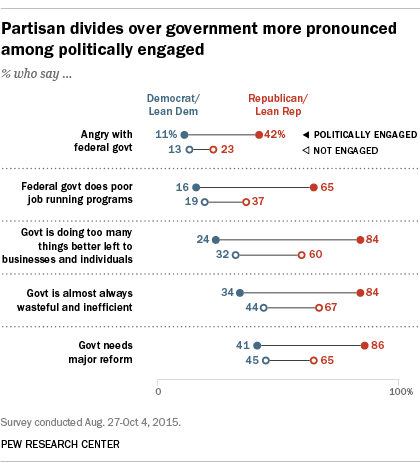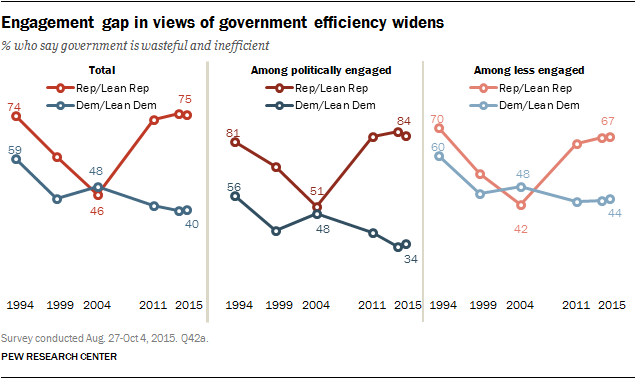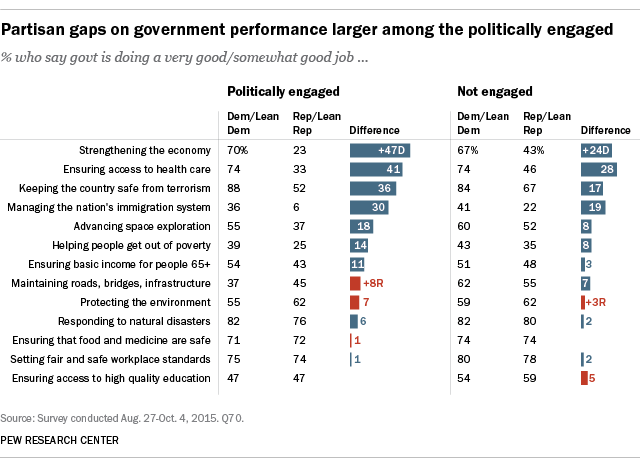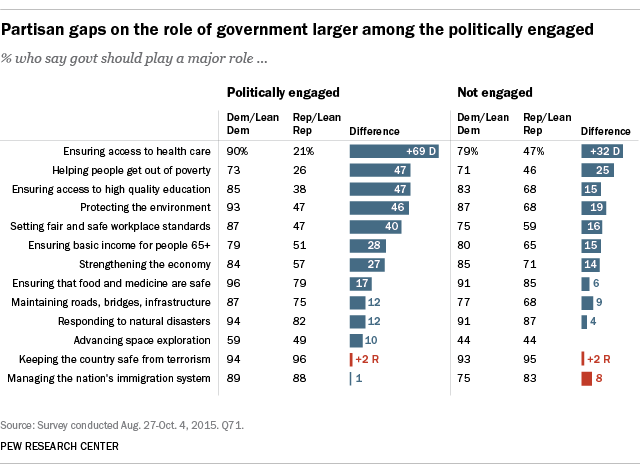As has been the case throughout the Obama presidency, Republicans hold considerably more critical views of government than Democrats across multiple measures. Today, 32% of Republicans and Republican leaners say they are angry with government; just 12% of Democrats and Democratic leaners say the same. And while three-quarters (75%) of Republicans say the federal government needs major reform, a much smaller share (44%) of Democrats say this.
Similarly, on a core question about government performance, a 57% majority of Democrats say “government often does a better job than people give it credit for,” while 40% say it is “almost always wasteful and inefficient.” In contrast, Republicans say the government is wasteful by about three-to-one (75% vs. 22%).

But these partisan divides over government, already wide, are particularly stark among those who are most politically engaged.
Across the board, politically engaged Republicans and Republican leaners – the nearly half (48%) of Republicans who are registered to vote, do so regularly and say they follow politics most of the time — are far more critical of the government than are less politically engaged Republicans.
The differences between politically engaged Democrats and those who are less engaged are not as pronounced. However, in several cases politically engaged Democrats and leaners (who make up 34% of all Democrats and Democratic leaners) are more positive about government than others in their party.
Fully 42% of politically engaged Republicans say they are angry with government (compared with 23% of the less engaged). And though about two-thirds (65%) of engaged Republicans say the government does a poor job running its programs, only about half as many (37%) less-engaged Republicans say this (a 46% plurality of the less-engaged rate the government’s performance as “only fair”).
Similarly, though majorities of both engaged and less-engaged Republicans say the government is wasteful and inefficient (84% and 67%, respectively) and that it does “too many things better left to businesses and individuals” (84% and 60%, respectively), these views are more widely held among politically engaged Republicans than less-engaged Republicans
By contrast, while only 24% of politically engaged Democrats say government is “doing too many things better left to businesses and individuals,” a slightly larger minority (32%) of less-engaged Democrats say this. But on many measures there are, at most, modest differences between these two groups. For instance, just 11% of engaged Democrats, along with 13% of less-engaged Democrats, say they are angry with government.
The end result is that partisan cleavages over government are even more pronounced among those who are the most likely to participate in the political process, echoing a growing link between engagement and broader ideological polarization.

This dynamic is not new – engaged Republicans have consistently been more critical of government than other Republicans – but it is as pronounced as ever. On the question of whether government is wasteful and inefficient or does a better job than people give it credit for, there is now a 50-percentage-point partisan gap among engaged partisans, compared with a 23-point gap between less-engaged Democrats and Republicans.
Politically engaged also divided over role and performance of government
In several opinions about the role and performance of government, the divisions between politically engaged Republicans and Democrats are substantial – and dwarf the differences among less-engaged partisans. In most cases, this larger gap is the result of far more negative evaluations of government’s performance among engaged Republicans than less-engaged Republicans, with little difference in ratings between engaged Democrats and less-engaged Democrats.
For example, while 70% of politically engaged Democrats say the government is doing a good job strengthening the economy, just 23% of engaged Republicans say this, a 47-point gap. Among those who are less engaged, that gap narrows to 24 points, largely the result of more positive assessments of government performance on this dimension among less-engaged Republicans.

Similar patterns are at work when it comes to government’s performance on health care and terrorism. This is also seen, to a lesser extent, on views of the government’s handling of immigration, space exploration, poverty and ensuring a basic income for older Americans.
Notably, ratings of the government’s performance maintaining roads, bridges and other infrastructure follows a very different pattern, a result of much lower ratings of government performance among the politically engaged in both parties – particularly Democrats.
But the extent to which engaged partisans are more divided than those who are less engaged is even more apparent when it comes to the role the government should play in each of these 13 areas. In five of the 13 areas asked about in the survey, there are gaps of 40 percentage points or more between engaged Democrats and engaged Republicans.
By comparison, the largest gap between less-engaged partisans is a 32-point gap over ensuring access to health care (79% of less-engaged Democrats say the government should play a major role, while 47% of less-engaged Republicans say this). On this same issue, there is a 69-point partisan gap among the politically engaged: 90% of engaged Democrats vs. just 21% of engaged Republicans see a major role for government in health care.

Education, the environment and workplace standards also stand out as areas on which majorities of both Democrats and Republicans generally see a major role for government, but this is not the case among politically engaged partisans. For example, just 38% of engaged Republicans say government should play a major role in ensuring access to high-quality education (in contrast to 68% of less-engaged Republicans and more than 80% of both engaged and less-engaged Democrats). Similarly, 68% of less-engaged Republicans say government should play a major role in protecting the environment, compared with 47% among politically engaged Republicans.
However, on several key areas of government activity, there is broad agreement even among engaged partisans that government should play a major role: Two-thirds or more of Republicans and Democrats, engaged and less-engaged alike, say government should play a major role in keeping the country safe from terrorism, managing the immigration system, responding to natural disasters, ensuring the safety of food and medicine and maintaining the nation’s infrastructure.




